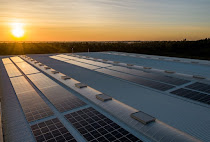Africa: a beacon of hope for a sunny future
Bathed in the radiant embrace of the sun, Africa is a continent brimming with untapped solar potential. While this abundance of sunlight presents an opportunity for sustainable development, Africa is currently facing an energy crisis as a large portion of its population lacks access to electricity. This paradox underscores the enormous potential of solar energy to transform Africa's energy landscape, positioning it as a leader in the global transition to a cleaner, more sustainable future.
Africa's solar advantage:
Africa's geographic location and vast territory make it an ideal candidate for solar energy. The continent receives an average of 2,000 to 3,200 hours of sunlight per year, more than any other region. This translates into an extraordinary solar energy resource estimated to be capable of generating over 400 terawatts of electricity, more than double the current global energy consumption.
Challenges and Uses: Possible
Although solar energy is available, Africa faces key challenges to the large-scale adoption of solar energy. They include:
High initial costs: The initial investment in solar infrastructure can be significant, requiring widespread adoption.
Limited infrastructure: Many African countries lack the reliable power grids needed to effectively distribute solar energy.
Insufficient financing: Access to sufficient capital for large-scale solar projects remains a challenge in many regions.
However, these challenges are not insurmountable. Through joint efforts and strategic investments, Africa can overcome these obstacles and unlock its enormous solar potential.
The path to solar leadership:
To fully realize its solar potential, Africa can take a multi-pronged approach:
Government support: Governments can implement policies that encourage the adoption of solar energy, such as tax breaks, subsidies and simplified permitting procedures.
Public-Private Partnership: Collaboration between governments, private investors and international organizations can mobilize the necessary capital for large-scale solar projects.
Capacity building: Investing in education and training programs can provide local communities with the skills and knowledge to develop and manage solar energy projects.
Technological Advances: Supporting solar research and development can lead to more efficient, cost-effective and scalable solar solutions.
Africa's journey to solar leadership is not just a journey to energy independence; it is an opportunity to bypass traditional energy sources, stimulate economic growth and create a sustainable future for its people. By harnessing its solar potential, Africa can create a global future not only for itself, but for the entire world.
Hope this helps! Let me know if you have any other questions.




Comments
Post a Comment